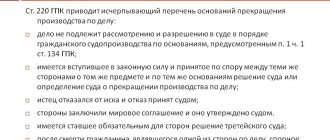1. A person who has committed a crime of minor or medium gravity for the first time may be released from criminal liability if, after committing the crime, he voluntarily confessed, contributed to the disclosure and investigation of the crime, compensated for the damage caused or otherwise made amends for the damage caused as a result of the crime, and as a result active repentance has ceased to be socially dangerous.
2. A person who has committed a crime of another category is released from criminal liability only in cases specifically provided for by the relevant articles of the Special Part of this Code.
Commentary on Article 75 of the Criminal Code of the Russian Federation
1. Exemption from criminal liability due to active repentance is possible only if the following conditions are met.
Firstly, this rule applies to a person who has committed one or more crimes for the first time, for none of which he was previously convicted, or if the acts he previously committed did not retain legal consequences.
Secondly, the crimes must be classified as minor or moderate in severity.
Thirdly, after committing a crime, the perpetrator must show active repentance, i.e. take any positive actions, an approximate list of which is given in the commented article. These include:
- confession. It means that a person who has committed a crime, of his own free will, turns to the body that has the right to initiate a criminal case, with a statement about the crime he has committed, which the authorities are often not yet aware of, and puts himself in the hands of the authorities. This application is documented in a protocol of voluntary appearance, which is signed by the applicant and an official of the relevant law enforcement agency;
- assistance in solving a crime. It may consist of issuing instruments and means of committing a crime, indicating the place where it was committed or the place where stolen property was hidden, incriminating other participants in the crime, etc.;
- voluntary compensation for damage caused, i.e. compensation for property damage in monetary or other terms sufficient to compensate for losses incurred by the victim as a result of the crime;
- otherwise making amends for damage caused as a result of a crime: eliminating destruction or damage to property caused by one’s labor; making amends for moral damage caused (apologizing for the insult, refuting false information that discredits the honor and dignity of another person or undermines his reputation, etc.).
Only the presence of a combination of the three specified conditions makes it possible to be released from criminal liability.
2. This type of exemption from criminal liability is optional and is not an obligation, but a right of the law enforcement officer. A decision can be made if the investigator or inquiry officer comes to the conclusion that it is inappropriate to bring to criminal responsibility a person who, after committing a crime, confirmed his repentance and thereby lost his danger to society.
3. Part 2 of the commented article deals with special types of exemption from criminal liability provided for in the notes to some articles of the Special Part of the Criminal Code. Their selection is due to the fact that they, as a rule, apply to persons who have shown active repentance after committing crimes not only of moderate gravity, but also serious and even especially serious crimes, contain not an optional, but a mandatory type of release and require the manifestation of active repentance for a specific the form specified in the Criminal Code.
The Supreme Court summarized the practice of exemption from criminal liability
The Supreme Court of the Russian Federation presented an overview of the judicial practice of exemption from criminal liability with the imposition of a judicial fine (Article 76.2 of the Criminal Code of the Russian Federation). This 14-page document was approved on July 10 by the court presidium.
As the Supreme Court notes, during the period of validity of Articles 76.2, 104.4, 104.5 of the Criminal Code of the Russian Federation, the institution of a judicial fine (introduced by Federal Law No. 323-FZ of July 3, 2016) confirmed its relevance in law enforcement practice. In accordance with statistical data from the Judicial Department of the Supreme Court of the Russian Federation, a judicial fine was imposed on 20,639 persons in 2017, and 33,329 persons in 2021. This criminal law measure was applied to persons who committed various crimes of minor and medium gravity (theft, fraud, misappropriation or embezzlement, intentional destruction or damage to property, etc.).
As a result of the generalization, the Supreme Court formulated a number of legal positions on complex aspects of judicial practice. In particular, the Supreme Court indicates that the criminal law does not provide as a mandatory condition for the release of a person from criminal liability on the grounds provided for in Art. 76.2 of the Criminal Code of the Russian Federation, consent of the victim.
The study of court decisions showed that in most cases, during the preliminary investigation, the opinion of the victims was clarified about the possibility of releasing a person from criminal liability, which was formalized either in the form of petitions from the victim to terminate the criminal case in accordance with Art. 25.1 of the Code of Criminal Procedure of the Russian Federation, or in the form of written consent to terminate the criminal case.
At the same time, based on the provisions of Art. 76.2 of the Criminal Code of the Russian Federation, the consent (disagreement) of the victim to terminate the criminal case and release the person from criminal liability in the manner established by Art. 25.1 of the Code of Criminal Procedure of the Russian Federation, has no decisive significance. In accordance with the specified norms of criminal and criminal procedural laws, the court must find out from the victim, as well as establish in other possible ways, whether the accused has taken measures to compensate for the damage or make amends for the harm caused by the crime in another way.
If the victim objects to the termination of the criminal case with the imposition of a court fine, then the judge finds out the reasons for this position of the victim, and also evaluates the sufficiency of the measures taken by the accused to compensate for the damage or make amends for the damage to recognize that the conditions provided for in Art. 76.2 of the Criminal Code of the Russian Federation.
Example. By the decision of the magistrate of judicial district No. 34 of the Sovetsky judicial district of the Kirov region dated October 25, 2021, a criminal case was opened against V., suspected of committing a crime under Part 1 of Art. 167 of the Criminal Code of the Russian Federation, terminated with the appointment of a criminal law measure in the form of a court fine in the amount of 10,000 rubles. At the court hearing, the victim did not agree with the termination of the criminal case, explaining that he refused to receive the money offered to him by the suspect in compensation for damage, because he believed that the amount of damage caused by the crime was underestimated by the expert, and the actual damage was a larger amount. The court of first instance considered the victim's arguments untenable, since the amount of damage was determined on the basis of the expert's opinion, the victim was familiarized with the expert's opinion, did not make any comments or statements during the review, and did not apply for additional or repeated examinations.
Article 75. Exemption from criminal liability in connection with active repentance
- home
- Laws and regulations
- Criminal Code of the Russian Federation
- Article 75. Exemption from criminal liability in connection with active repentance
1. A person who has committed a crime of minor or medium gravity for the first time may be released from criminal liability if, after committing the crime, he voluntarily confessed, contributed to the disclosure and investigation of this crime, compensated for damage or otherwise made amends for the harm caused by this crime, and as a result of active repentance has ceased to be socially dangerous.
2. A person who has committed a crime of another category is released from criminal liability only in cases specifically provided for by the relevant articles of the Special Part of this Code.
Commentary on Article 75
Exemption from criminal liability means a decision expressed in an official act of a competent state body to release a person who has committed a crime from the obligation to be convicted by a court and undergo state coercive measures. In this case, criminal liability does not find its realization either in the public condemnation of the perpetrator, or in punishment, or in other measures of a criminal legal nature.
The social significance of the institution of exemption from criminal liability is that the state places trust in the person who committed the crime and counts on his law-abiding behavior in the future. Release from criminal liability is not the rehabilitation of the accused or suspect or their forgiveness (with the exception of an amnesty). It rather testifies to the provision of leniency on the part of the state to the guilty person, given the possibility of achieving the goals of criminal legislation without convicting the guilty person.
The general basis for releasing a person who has committed a crime from criminal liability is the inappropriateness of bringing him to court and applying other measures of a criminal legal nature to him. This general basis is specified in relation to certain types of exemption from criminal liability. But this basis can only take place under certain conditions. Among them it is necessary to highlight the following.
First. As a general rule, exemption from criminal liability is possible only if a crime is committed for the first time of minor or moderate gravity. These indicators may, if there are other grounds, indicate that both the act and the personality of the perpetrator do not pose a great danger to society. Second. As a general rule, a person who has committed a crime must, in one form or another, established by law, make amends for his guilt. Third. Exemption from criminal liability, regardless of the category of crime, can only occur due to the expiration of the statute of limitations. Fourth. Exemption from criminal liability is possible due to an act of amnesty. However, amnesty in the Criminal Code is not classified as a basis for exemption from criminal liability, but is considered in a separate chapter, since it applies to an indefinitely large circle of persons who meet the conditions of the amnesty.
Exemption from criminal liability on the grounds provided for by the Criminal Code of the Russian Federation does not mean declaring a person innocent of committing a crime. This also does not mean that the crime committed in accordance with Part 2 of Art. 14 of the Criminal Code of the Russian Federation is insignificant and, therefore, there is no corpus delicti. Exemption from criminal liability is also not related to the presence of circumstances excluding the criminality of the act. This institution applies to persons who have committed a crime, but under such circumstances and conditions when there is the possibility of non-application of measures of criminal repression.
A procedural form of exemption from criminal liability is a resolution of the inquirer with the consent of the prosecutor, as well as an investigator with the consent of the head of the investigative body or a judge, or a court ruling to terminate a criminal case, if one has been initiated, or a resolution of the inquiry body, the inquirer or investigator to refuse to initiate a criminal case. case, if the decision to release from criminal liability was made at the stage of pre-investigation verification of the circumstances of the crime. Moreover, in some situations, the above authorities have the right to apply the institution of exemption from criminal liability (for example, Article 75 of the Criminal Code of the Russian Federation), in other cases the application of this institution is the responsibility of these authorities (for example, Article 78 of the Criminal Code of the Russian Federation).
The Criminal Code of the Russian Federation knows the following types of exemption from criminal liability:
1) in connection with active repentance (Article 75);
2) in connection with reconciliation with the victim (Article 76);
3) due to the expiration of the statute of limitations (Article 78).
All of the above types of exemption from criminal liability are unconditional: the exemption is final and cannot subsequently be canceled for any reason.
The commented article regulates the issues of exemption from criminal liability in connection with active repentance.
In accordance with Part 1 of Art. 75 of the Criminal Code of the Russian Federation, a person who has committed a crime of minor or moderate gravity for the first time may be released from criminal liability if, after committing the crime, he voluntarily confessed, contributed to the detection of the crime, compensated for the damage caused or otherwise made amends for the damage caused as a result of the crime, and as a result of active repentance has ceased to be socially dangerous.
Thus, this norm defines the conditions under which a person can be released from criminal liability on the grounds in question.
First of all, such a condition is the fact of committing a crime for the first time. This means that the person has not previously committed a crime at all or has been released from criminal liability for a crime committed or was previously convicted, but the criminal record was withdrawn or expunged in the manner prescribed by law and, therefore, there are no legal consequences of the criminal record.
As noted in paragraph 20 of the Resolution of the Plenum of the Supreme Court of the Russian Federation dated January 11, 2007 No. 2 “On the practice of imposing criminal punishment by the courts of the Russian Federation,” a person who has committed one or more crimes for no reason should be considered to have committed a crime of minor or medium gravity for the first time. of which he has not previously been convicted, or when the previous sentence against him has not entered into legal force.
A person cannot be released from criminal liability due to active repentance if he was previously convicted of any crime and has a criminal record. It does not matter what type and amount of punishment it was sentenced to (fine, correctional labor, suspended sentence, imprisonment).
In practice, the question also arises of whether a person can be considered to have committed a crime for the first time if he was previously released from criminal liability on non-rehabilitative grounds, since in this case the crime objectively committed is not the first. Here it should be noted that this is not the first time that recognizing a person as having committed a crime is associated with certain legal consequences. However, upon termination of a criminal case, the person is considered not to have a criminal record and, when deciding on the possibility of terminating a new criminal case in connection with reconciliation with the victim, must be recognized as having committed a crime for the first time.
Further, exemption from criminal liability due to active repentance is possible only if the crime committed falls into the category of minor or moderate gravity. The commission of a crime of another category excludes exemption from criminal liability on the basis of Part 1 of Art. 75 of the Criminal Code of the Russian Federation.
The next mandatory condition with which the law connects the possibility of exemption from criminal liability is the positive post-criminal behavior of the perpetrator. If the above two conditions are met, release can only take place when the offender has committed one or more actions specified in the law, namely: confessed, contributed to the discovery of the crime, compensated for the damage caused, or otherwise made amends for the harm caused as a result of the crime.
Confession
must be voluntary, which means a conscious active action of the person who committed the crime associated with contacting the police, the prosecutor's office or the court with a statement about what he has done. Confession must not be made under the influence of coercion or a forced situation, when sufficient evidence of his guilt has been collected against the perpetrator. In addition, surrender will be voluntary when the investigative authorities knew nothing about the person who committed the crime or about the crime itself. At the same time, it should be borne in mind that the law does not connect the presence of voluntariness with the motive of a person’s behavior, as well as with the circumstances that preceded the confession or influenced the decision made.
To terminate a criminal case due to active repentance, it is necessary that the person who committed the crime voluntarily confess and help solve the crime. In cases where any of the conditions are absent and instead of confession and assistance in solving a crime, for example, only sincere repentance takes place, the application of Art. 28 of the Code of Criminal Procedure of the Russian Federation is impossible, since the circumstances specified in the law, which together allow us to draw a conclusion about active repentance, will only be circumstances mitigating the punishment.
Contributing to solving a crime
means the performance of actions aimed at fully solving a crime, including the discovery of valuables obtained as a result of the commission of a crime. Facilitation will be, for example, an indication in the confession of persons who took part in the commission of the crime together with the perpetrator, the location of the instruments and weapons of the crime, stolen property, a corpse and other actions that are important for the complete, objective and prompt disclosure of the crime.
Compensation for damage caused and reparation of harm
can take place both in the form of payment of an agreed sum of money, and in the elimination of harm in kind (transferring to the victim other equivalent property instead of damaged or destroyed, correction of damaged property, clothing, vehicles, etc.). It is possible to make amends for moral damage, to make a public apology to the offended person, to refute the data that served as the basis for slander, etc.
To be released from criminal liability on the grounds under consideration, it is important that all the actions of the perpetrator after the commission of the crime give the court the opportunity to come to the conclusion that the person has lost the sign of public danger.
If all the conditions specified in Part 1 of Art. 75 of the Criminal Code of the Russian Federation, the competent authorities have the right, but are not obliged, to decide to release the perpetrator from criminal liability.
Part 2 of Art. 75 of the Criminal Code of the Russian Federation establishes the possibility of applying exemption from criminal liability in connection with active repentance and in relation to persons who have committed serious and especially serious crimes. But such release is possible only in cases specifically provided for by the notes to the relevant articles of the Special Part of the Criminal Code of the Russian Federation (kidnapping - Art. 126 of the Criminal Code of the Russian Federation; commercial bribery - Art. 204 of the Criminal Code of the Russian Federation; terrorist act - Art. 205 of the Criminal Code of the Russian Federation; hostage taking - Art. 206 of the Criminal Code of the Russian Federation; organization of an illegal armed group or participation in it - Article 208 of the Criminal Code of the Russian Federation, etc.).




